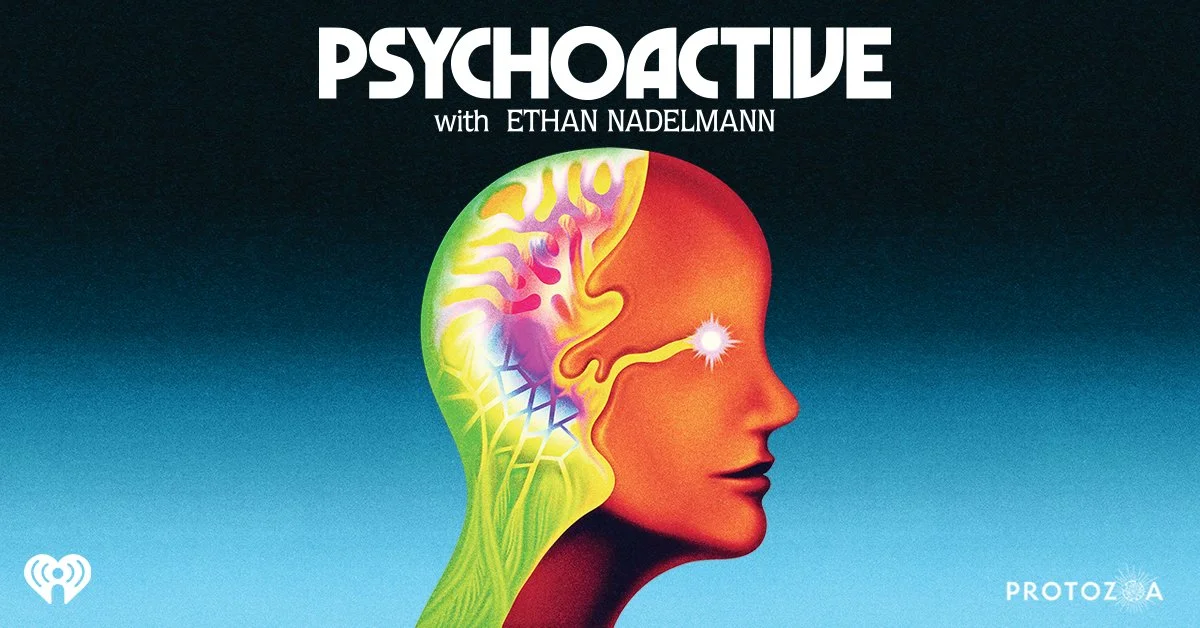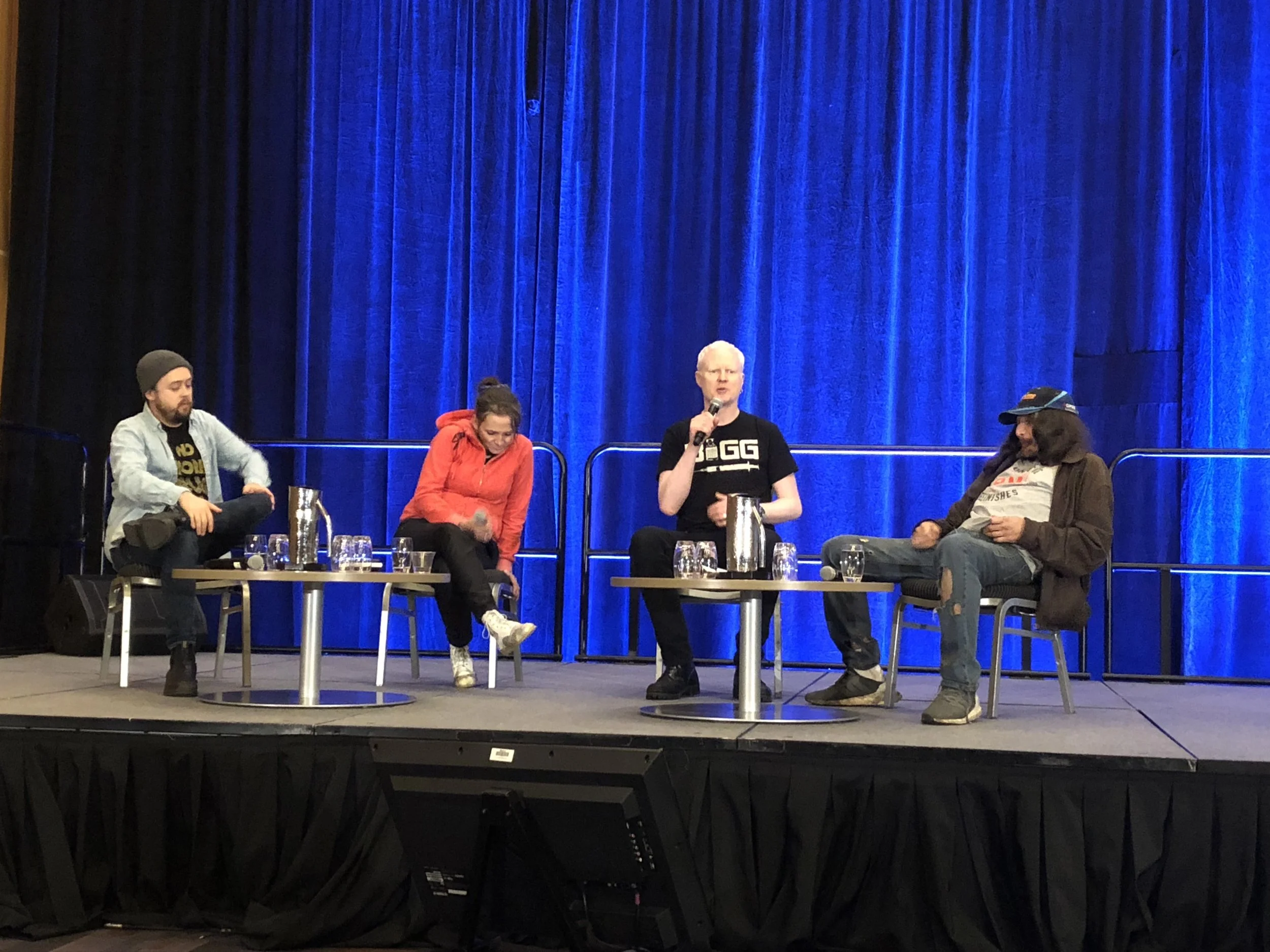What happens when you give drug users drugs?
In this bonus episode, we’re introducing On Drugs from CBC.
On Drugs from CBC looks through the lenses of history, pop culture and personal experience to understand how drugs have shaped our world. Because even if it’s just caffeine or ibuprofen, there’s a good chance you’re on drugs right now.
In Vancouver’s East Hastings, the Safe Supply program challenges the conventional narrative that sobriety is the ultimate goal. Host, Geoff Turner visits the Vancouver Area Network of Drug Users office to sit down with Garth. This episode explores harm reduction, examining how drug addiction intersects with issues of poverty, shame, and community. Are programs like these changing lives? Why did they end? Did decriminalization really fail?
More episodes of On Drugs are available at: https://link.mgln.ai/Hipojc
Psychoactive Swap
I know you haven’t heard from us in a while. We’ve been busy. There’s a lot going on behind the scenes.
So while we’re working on new episodes, we’ve done a swap with another podcast. Crackdown and Psychoactive podcast are swapping episodes. They played our episode on the Drug User Liberation Front. And we are playing their interview with me.
I know you haven't heard from us in a while. We’ve been busy. There’s a lot going on behind the scenes.
So while we’re working on new episodes, we’ve done a swap with another podcast. Crackdown and Psychoactive podcast are swapping episodes. They played our episode on the Drug User Liberation Front. And we are playing their interview with me.
In our conversation, we talk about my life as a young drug user, how I got involved in organizing against the drug war and how maybe Canada gets too much credit for harm reduction.
You can check out Psychoactive with Ethan Nadelmann here: https://podcasts.apple.com/us/podcast/psychoactive/id1574548562
Editorial Statement on the Criticism of Suboxone
A response to criticisms of our episode “Cop Baked In” by physicians.
To our listeners,
Crackdown’s recent episode (#27), titled “Cop Baked In”, was critical of the medication Suboxone (sublingual buprenorphine/naloxone) for its design, which (as a partial agonist) blocks feelings of euphoria from other opioids, and questioned the highly hyped rollout of new Suboxone prescribing guidelines in BC around 2016, when the province’s “overdose crisis” was declared a state of emergency.
That declaration was more than five years ago.
And yet, we continue to see rising numbers of overdose-related deaths, and a poisonous drug supply that doesn’t seem to respond well to our traditional models of Opioid Agonist Therapy (OAT) prescribing.
Crackdown has wanted to open the conversation about Suboxone for quite some time. Because, as it stands today, Suboxone is still considered (by many prescribers and healthcare/government-funded research orgs) to be the first line of treatment for persons diagnosed with opioid use disorder (OUD). This concerns us as we have received preliminary research data suggesting that Suboxone patients are more likely to discontinue treatment than those prescribed methadone. This is not surprising to us at Crackdown because for years we have heard people who use drugs saying that Suboxone does not work for them.
As investigative journalists on the front lines of the war on drugs, we decided to use a personal narrative as well as qualitative research on youth’s experiences and perspectives on OAT to start a dialogue about something that we felt had not yet been discussed as a barrier to care.
Since the publication of “Cop Baked In”, we have received positive feedback from drug users. We have also received negative comments from doctors and other prescribers across the country. This was expected, and we have certainly started a dialogue.
For example, it has been suggested by one listener that we implied (or stated) that Suboxone is “ineffective”. There has been speculation that by starting a dialogue about Suboxone’s limitations, we may “harm people by scaring them away from a lifesaving treatment.”
That same listener said, “Garth makes it seem like Suboxone does not work for anybody, not worth trying, or implementing as a policy response.”
Another listener said our reporting “ludicrously claims that the buprenorphine molecule itself is coercive.”
A Twitter user even commented, “I guess I’m a basic bitch because I prescribe Suboxone to my patients.”
We received more comments in a similar vein.
The Editorial Board of Crackdown felt compelled to release a statement in response.
We did not describe Suboxone (or any treatment) as “ineffective.” I encourage critics to listen to the episode again, and really listen to the words we use. Because our language and the way we use it is intentionally designed to avoid sweeping generalizations. We ask questions; we don’t claim to have all the answers. Also, I (Reija Jean) attained periods of stability while on Suboxone. What we attempted to show was the difficulty that some can experience when trying to stabilize or re-stabilize after a period of using street supply.
We do not believe that by raising concerns about a treatment like Suboxone that patients will be “scared to take it.” Many folks in our communities are already wary of Suboxone, because they’ve had bad experiences like precipitated withdrawal (have our critics ever been in precipitated withdrawal?). Every body is different, and will experience drugs differently. Furthermore, drug users are already talking about their experiences with each other. If prescribers want to close their ears to our concerns about Suboxone, we wonder why? Perhaps we are raising concerns because what we want and need is a range of OAT treatment options that are informed by drug users and what we want and need from our medication. Why does it seem like some care providers don’t want to hear it?
We did not claim that Suboxone or the buprenorphine molecule “is coercive.” But the lack of choice we are given and the disempowerment drug users experience in our relationships with doctors, nurses and prescribers is coercive. We told my (Reija Jean’s) personal story in which I felt Suboxone was my only option, that it was “better than methadone”, that it was “easier to come off of”, and a host of other claims that are not, it turns out, entirely accurate. I believed these things because that was the information given to me by healthcare providers and I felt coerced into accepting Suboxone or leaving with nothing.
Here are some suggestions for listeners who found themselves reacting defensively to our episode:
Try to listen to me—the human, Reija Jean—tell my story. Listen to my words. Listen to the words used by our host Garth Mullins and by our scientific advisor Dr. Danya Fast. If you find yourself feeling upset, angry, or defensive, perhaps pause the episode and ask yourself, “Why do I feel this way? What is being triggered here?” Because those kinds of feelings are rarely about the external; generally, they come from somewhere deep inside ourselves—perhaps a feeling that remains unresolved. Who knows? Only you.
See if it is possible to listen to the episode with a different frame of mind. Experiment with different lenses. Such as, the lens of a person who actually has experience taking drugs like Suboxone, and the fear generated by folks who have experienced unexplained withdrawal-type symptoms post-lapse or relapse, as well as precipitated withdrawal. Try to put yourself in the body (as much as is possible) of the person who has undergone a series of medication changes and alterations, and the person who has hoped for a miracle cure—or just to feel joy, pleasure, or an absence of pain—who has been disappointed again and again. Consider what it is like to depend on a medication like Suboxone for your survival. Consider what it is like to get a prescription for this medicine, after a period of using street supply, taking it at home, and still feeling sick. Imagine you are sweating it out at home, with no support because it’s the weekend and your clinic is closed. There is nowhere to go. No family or friends. And your dealer, who can make you feel better in an instant, is just down the street.
Crackdown will not stop talking about Suboxone, or any other aspect of OAT. Ultimately, we want drugs that are preferred by us, not (only) by prescribers. We, as patients and end-users, deserve to be asked what we need and what is missing. We deserve to be treated like the subject-matter experts we are. Because, believe it or not, we know what we need. We know what is missing. Many of us understand the flaws in many of the methods that have been conducted by pharmaceutical companies. We know what research questions need to be investigated (like the effect of setting and care quality on withdrawal symptoms, or about what actually happens to the patient who takes a bupe to-go pack home).
How can we work together to address the social determinants of health, including equitable access to healthcare, housing and proper individualized medication support, so that we can finally stem the tide of this unprecedented flood of death?
Rather than complain about our reporting (or at least, in addition to complaining), why don’t you commit yourselves to trying to understand Suboxone’s limitations, as well as the limitations of other OAT treatments—many of which are not keeping up with today’s toxic fentanyl and (now) venomous benzodiazepine-laden supply.
Sincerely,
Reija Jean and the Editorial Board of Crackdown
P.s.
Basic bitch or not, it’s not all about you.
Yard Tales Swap
This month we’re bringing you an episode of the podcast Yard Tales, where Garth was recently a guest.
This month we’re bringing you an episode of the podcast Yard Tales, where Garth was recently a guest. Crackdown’s musical wizard James Ash is also featured on this one.
Yard Tales is a show about forbidden spaces hosted by Luz Fleming. Some stories feature border crossings, life altering events, the need to express one’s self at all costs, and that moment in life when a decision has to be made and a line has to be crossed.
You can find out more about Yard Tales and listen to more episodes at https://www.yardtales.live/.
Live at AAA 2019
As drug users, we’ve gotten familiar with what it feels like when anthropology is done to us. But in this panel we talk about what it looks like when anthropology is done with us, in partnership.
Here’s a little bonus content.
In November of 2019, Crackdown held a panel at the American Anthropological Association Conference in Vancouver. As drug users, we’ve gotten familiar with what it feels like when anthropology is done to us, when we are its subjects - its Guinea pigs. But in this panel we talk about what it looks like when anthropology is done with us, in partnership.
Garth talks to Crackdown Editorial Board members Jeff Louden and Laura Shaver, and Crackdown Science Advisor Ryan McNeil, about Methadose. Then, Garth leads a discussion with Danya Fast, Research Scientist at the BC Centre on Substance Use and Assistant Professor in the Department of Medicine at UBC; Helena Hansen, Adjunct Associate Professor in the Department of Psychiatry at NYU Grossman School of Medicine; and Andrea López, Assistant Professor in the Department of Anthropology at the University of Maryland.
Updates
The next episode will be out in a couple weeks. In the meantime, here’s what we’ve been up to.
The next episode will be out in a couple weeks. In the meantime, here’s what we’ve been up to:
In October, British Columbia had an election. Sam Sullivan, a long-standing Member of the Legislature for the Liberal Party of BC, campaigned against a new safe injection site. In one of his anti-OPS campaign ads, Sullivan ripped a quote by Garth from a Tyee article and used it out of context, falsely implying that Garth agrees with Sullivan. We made some noise and it became a small scandal for a few days, and in the end Sullivan lost his race. A number of Liberal candidates who campaigned against poor people and harm reduction also got the boot.
Earlier this month, voters in Oregon passed a measure to decriminalize possession and personal use of all drugs. More recently, the City of Vancouver passed a motion to ask permission from the federal government to similarly decriminalize drug possession within city limits. We will be watching how this develops closely and reminding the government: nothing about us without us.
In October, the maker of Methadose, Mallinckrodt Pharma, filed for bankruptcy. The company claims it cannot afford to fight a lawsuit launched by Laura Shaver. Our legal case alleges that Methadose contributed to the overdose crisis. The courts allowed Mallinckrodt to sever itself from our proposed class action. That sucks, but our case against the government of BC and the College of Pharmacists continues, and we will still get discovery – that means they still have to produce files and documents for evidence.
BC is the midst of a second wave of COVID-19. Cases are way up, so Crackdown is back to remote production for now.
Crackdown is a naloxone distribution site, which means we provide naloxone and training to use it. We’ve given out about 75 kits this year, but COVID has interrupted our ability to provide training.
There’s a new episode and a new season – coming up.
Be safe. Keep six.
Music featured: “A Pill for Everything” by Charlie Frederick
The Palace
This month, Crackdown is exploring the pernicious connections between North America’s overdose crisis and the housing crisis. Next week’s show will be a full documentary. This week, Crackdown editorial board member Al Fowler tells the story of Vancouver’s infamous The Palace Hotel and the tyrannical landlord who ran the place.
Crackdown Editorial Board member Al Fowler. Al is an organizer with the BC Association of People on Methadone and the Vancouver Area Network of Drug Users.
This month, Crackdown is exploring the pernicious connections between North America’s overdose crisis and the housing crisis. Next week’s show will be a full documentary. This week, Crackdown editorial board member Al Fowler tells the story of Vancouver’s infamous The Palace Hotel and the tyrannical landlord who ran the place.
Transcript
A full transcript of this episode is available here.
Additional Reading
Cole, Yolande. “Vancouver non-profit group to take over two Downtown Eastside buildings.” The Georgia Straight. August 18, 2011.
Massah, Sarah. “Bullied tenants forced to buy methadone from slumlord: claim.” CTV News Vancouver. August 19, 2011.
Harbottle, Tyler. “Palace of Hell.” The Tyee. August 24, 2011.
PIVOT Legal. Press Release: “Eleven more tenants come forward in Wolsey Hotel Case.” November 22, 2011.
Fleming et al. (2019) Housing in Crisis: A qualitative study of the socio-legal contexts of residential evictions in Vancouver’s Downtown Eastside. International Journal of Drug Policy.
Collins et al. (2018) Surviving the housing crisis: Social violence and the production of evictions among women who use drugs in Vancouver, Canada. Health & Place.
Kennedy et al. (2017) Residential eviction and exposure to violence among people who inject drugs in Vancouver, Canada. International Journal of Drug Policy.
Credits
Garth Mullins is Crackdown‘s host and executive producer.
Al Fowler is this month’s lead editorial consultant.
Crackdown’s Editorial Board is: Samona Marsh, Shelda Kastor, Greg Fess, Jeff Louden, Dean Wilson, Laura Shaver, Dave Murray, Al Fowler, and Chereece Keewatin (RIP).
Crackdown is produced by Garth Mullins, Sam Fenn, Alexander Kim, Lisa Hale and Gordon Katic. Our scientific adviser is Ryan McNeil from the BC Centre on Substance Use.
The music for this episode was written by Garth Mullins, Sam Fenn, and Jacob Dryden.
Thanks to the Social Sciences and Humanities Research Council and the Canadian Institutes of Health Research for ongoing funding to Crackdown.











